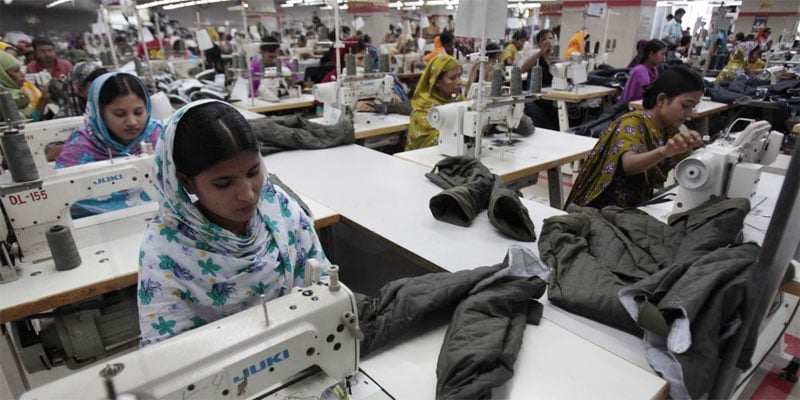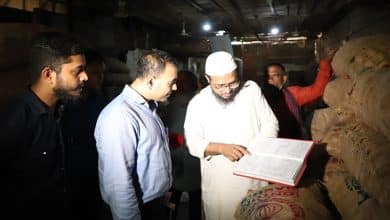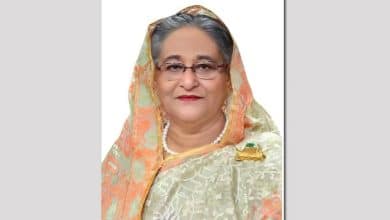Int’l clothing brands pushes for innovation for sourcing RMG from Bangladesh

International clothing retailers and brands have emphasized on innovation, improvement of efficiency and use of synthetic raw materials for long term sourcing of garment items from Bangladesh.
Bangladesh has already achieved a lot in garment trade as the country is the second largest supplier of apparels worldwide after China.
Now time has come to make the achievement as sustainable with the innovation and bringing variation in products and quality of goods, the retailers and brands said at a discussion on ‘RMG Roadmap: Towards a Prosperous Future’ held at the Made in Bangladesh Week at the International Convention City, Bashundhara (ICC-B) in Dhaka.
Anne-Laure Descours, chief sourcing officer of Puma said Bangladesh needs to go for synthetic raw materials production as the country is already strong in cotton fibre made garment items.
She also said the setting up green garment factories will continue as the country is champion in green units worldwide.
Francisco Javier Losada Montero, chief sustainability officer of Inditex, said Bangladesh is already in a very good position regarding innovation.
Bangladesh needs to improve the online trading and strong collaboration between the retailers and suppliers, he said.
Rita Lohani, director for operations of Walmart Sourcing, Bangladesh suggested for diversity in products and improving the efficiency in garment production as those are related to the sustainability.
“Next 10 years are important for the country’s garment sector as Bangladesh has already come a lot in the garment trade,” she said.
Winnie Estrup Petersen, ambassador of Denmark to Bangladesh, said Denmark is supporting through International Labour Organisation in health and workplace safety.
“Both Bangladesh and Denmark have been building partnership for more business between the two countries,” she added.
Kutubuddin Ahmed, former president of Bangladesh Garment Manufacturers and Exporters Association (BGMEA), said for forming a committee involving the BGMEA for solving the ongoing crises like energy.
“Currently, the main problem in the sector is energy crisis stemmed from the Russia Ukraine war,” he said.
Because, a study in 2020 showed that 67 percent customers wanted sustainable products and 20 percent consumers wanted the brands to be proactive in those regards like transparency and traceability of products.
Bangladesh has already successfully attained the first phase in garment business as the country has the highest number of green garment factories and second largest exporter after China.
However, now the time has come to take the second phase by improving the workplace safety, utility, water and chemicals uses, Ahmed said.
So, use of modern technologies is also very important, he said, adding that a technology can recycle 90 percent water used in the textile and garment industries.
China exported $240 billion worth of garment items and is the first in the world and Bangladesh is the second largest exporter with only $42.62 billion.
So, there is a huge gap between the first and second exporters and Bangladesh has a lot scope to grab more market share globally, Kutubuddin added.
While moderating the session, Miran Ali, vice president of the BGMEA, focused on the current struggle faced by the manufacturers as well as chart out a roadmap for improving the overall business environment of Bangladesh.
In another session titled “From Global to Local value chains – strategic alliance and collaborative capacity building for a diversified industry” focused on the important fact that Bangladesh should focus on diversification both in terms of fiber and markets.
Nasir Ezaz Bijoy, CEO, Standard Chartered Bank Bangladesh, highlighted how financial sector can assist in this journey of diversification.
Bangladesh’s graduation from LDC status and preparation for ensuring a smoother transition was also highlighted in this session.
“We need to improve our forecasting model and business risk management for the next 10 to 20 years,” said Md. Jashim Uddin president of the Federation of Bangladesh Chambers of Commerce and Industry at another session.
He said inter-industrial cooperation with potential business expansion and investments in jute, leather, Fast Moving Consumer Goods and automobiles aligning with the RMG to strengthen their capacity and international market outreach.
Ranjan Mahtani, chairman of Epic Group, said, “Shed light how fashion is changing and where should we focus on to adapt with the changed scenario”.
M Shahriar Alam, state minister for Foreign Affairs, said a section of people has been investing money abroad to appoint lobbyists to continue propaganda against the Bangladeshi garment items and for suspending the GSP status for the country.
Those people should be identified and needs to make them understand and if necessary it is needed to cut off business relationship with them, he said at the opening remarks of the plenary session.
BGMEA and Bangladesh Apparel Expo organised the Made in Bangladesh Week





